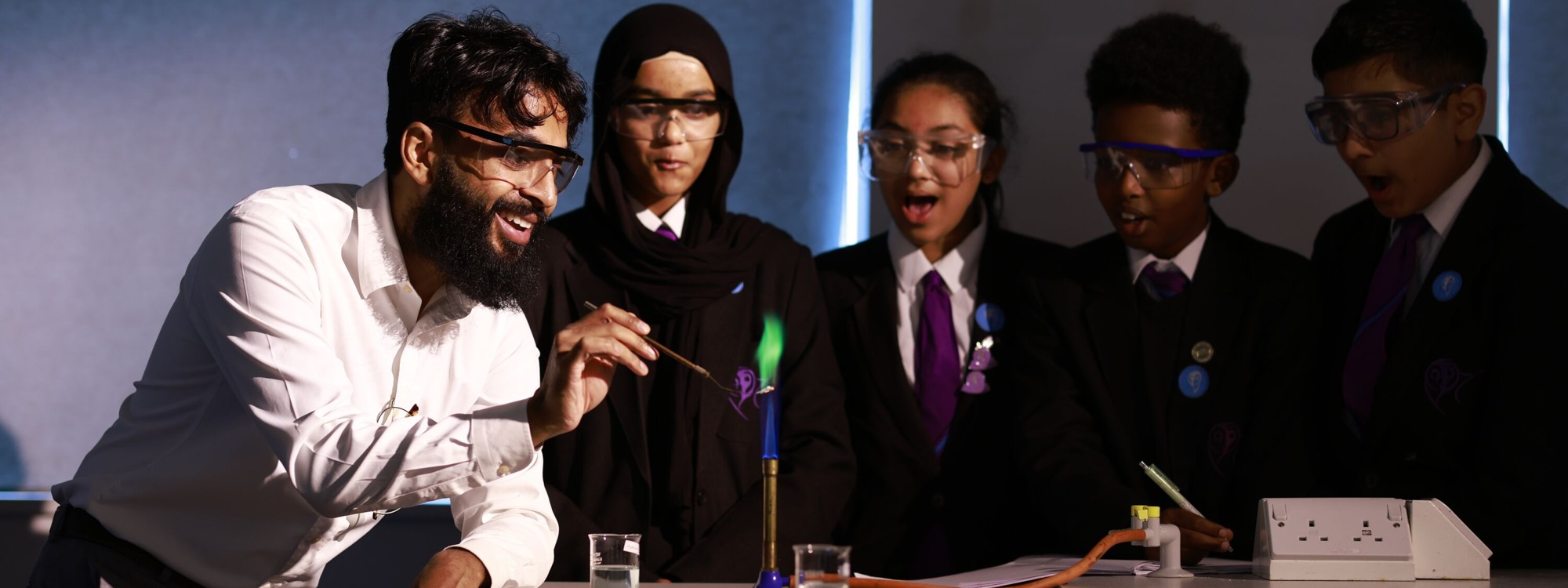- Home
- About
- Curriculum: Subjects
- Science
Science
In Science students learn about how the world, and universe, around them works. The Science curriculum is based on broadening students’ future prospects by covering a broad range of scientific concepts which equip students to understand the questions about the mechanics of everyday life, whether or not they choose to pursue Science after finishing their GCSE studies. Our aim is that every student will gain cultural and scientific literacy which will allow them to actively participate in the world around them.
Our students are taught about the Scientific Method – the process by which scientific discoveries lead to new theories. This scientific literacy equips students to make informed life decisions. Students are actively encouraged to question the world around them and to think critically about new information. In both Key Stage 3 and Key Stage 4, there is a strong focus on carrying out relevant experiments in order to support students’ understanding of new ideas.
KS3
At Key Stage 3, the curriculum includes a much broader range of areas than those which are later focused on at GCSE. Throughout Key Stage 3, students are focusing on building up their knowledge in “Powerful Ideas” in each area of Science – Biology, Chemistry and Physics for example:
-
The diversity of organisms, living and extinct, is the result of evolution by natural selection.
-
Objects are made from materials, and materials are made from one or more substances built from atoms.
-
Every particle in our Universe attracts every other particle with a gravitational force
By revisiting, and building on these ideas each year, students develop a deep understanding of them.
KS4
At Key Stage 4, students have the choice to continue studying Combined Science, at either Foundation or Higher level, or to choose Separate Science as one of their GCSE options. Both the Combined Science and the Separate Science Curriculums are based on studying Biology, Chemistry and Physics, with the difference being that students studying Separate Sciences will complete a slightly longer course, covering more topics within each Science.
We encourage our students to develop their learning beyond the classroom with trips to the Science Museum and the National History Museum. In Year 8, all students have the opportunity to enter the Solutions to the Planet competition, where students from our school have reached the national finals.
Curriculum Maps
Science Curriculum Map - Year 7Science Curriculum Map - Year 8Science Curriculum Map - Year 9Combined Science Curriculum Map - Year 10Combined Science Curriculum Map - Year 11Separate Science: Biology Curriculum Map - Year 10Separate Science: Chemistry Curriculum Map - Year 10Separate Science: Physics Curriculum Map - Year 10Separate Science: Biology Curriculum Map - Year 11Separate Science: Chemistry Curriculum Map - Year 11Separate Science: Physics Curriculum Map - Year 11
Knowledge Organisers
Year 11
Biology
Biology Key ConceptsEcologyExchange and TransportHealth and DiseaseHormonesPlants
Chemistry
Quantitative ChemistryElectrolysis Metals and Reversible ReactionsFuels and the AtmosphereGroups, Rates and Heat Changes
Physics
ElectricityEnergy Forces and EffectsMagnetism and Electromagnetic InductionParticle Model Forces and MatterRadioactivity
Contact Science
Do you need assistance from a member of staff?
We have a team of talented, motivated staff who help deliver the best possible education to each of our students.

